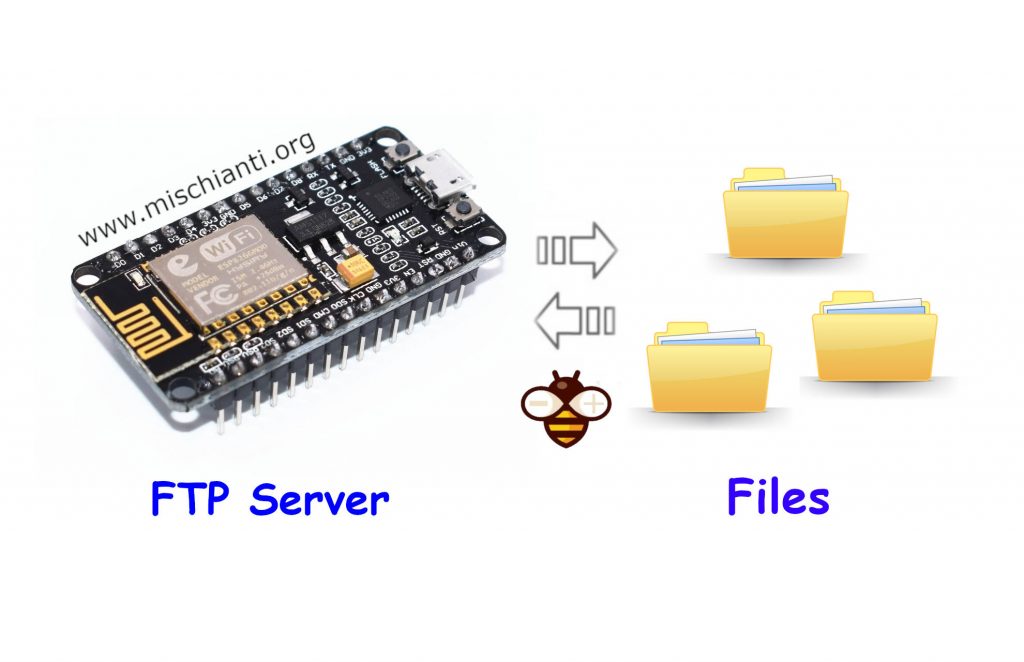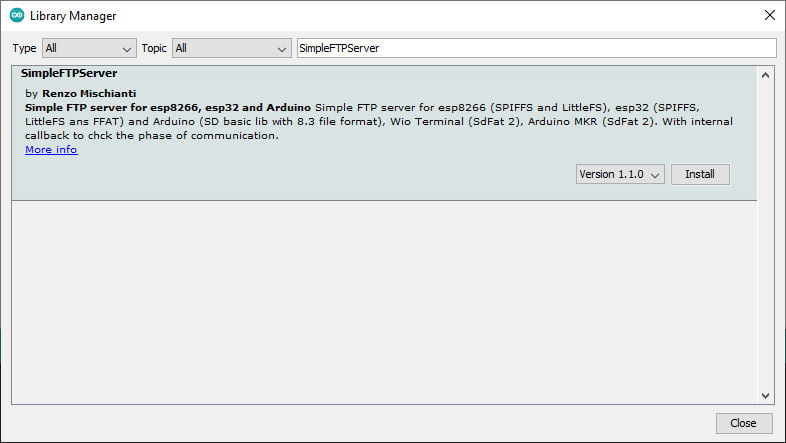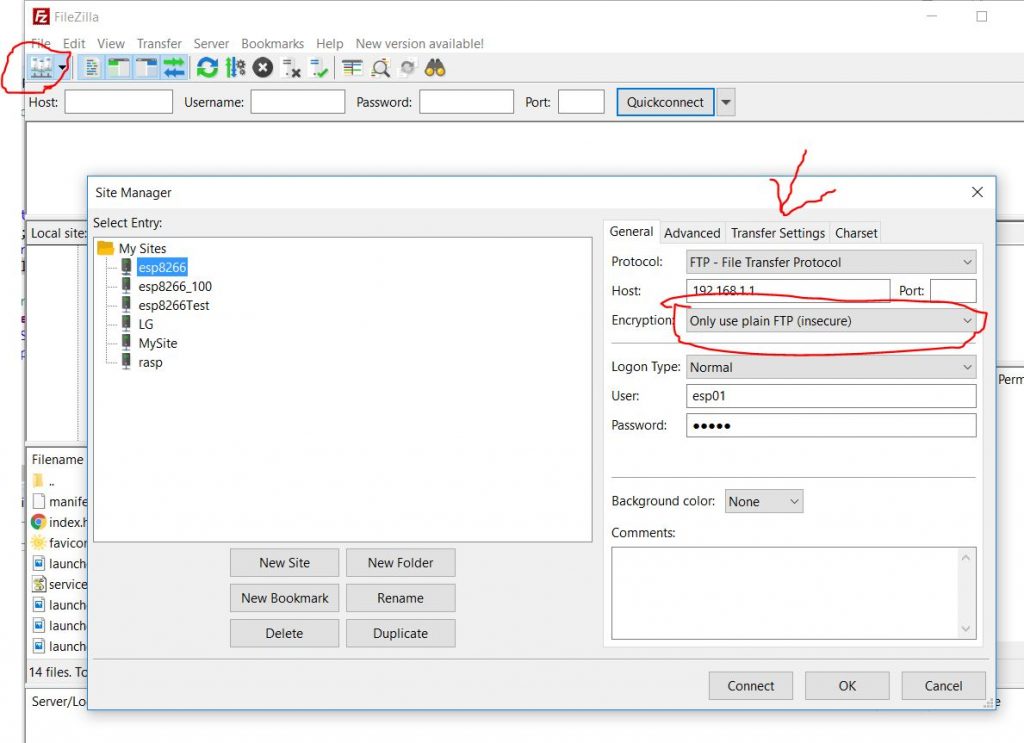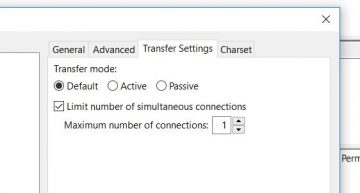Uploading Files to Esp8266 Spiffs With Ftp
When I develop a new solution, I'd like to dissever the application into layers, and and so I'd like to focus my attention on only one attribute at a fourth dimension.
In item, I separate the REST layer (written inside the microcontroller) and the Front-Terminate (composed in Angular, React/Redux, or vanilla JS), so I'd similar to upload a new web interface directly to the microcontroller via FTP.

For static information (Spider web pages, for example) that do non alter frequently, esp8266 or esp32 have internal SPIFFS (SPI Flash File Arrangement). Yous can upload data via Arduino IDE as explained in the commodity "WeMos D1 mini (esp8266), integrated SPIFFS Filesystem" for esp8266 or "ESP32: integrated SPIFFS FileSystem" for esp32 or with LittleFS "WeMos D1 mini (esp8266), integrated LittleFS Filesystem" for esp8266 or "ESP32: integrated LittleFS FileSystem" for esp32 or "ESP32: integrated FFat (FAT/exFAT) FileSystem" but for fast performance and future support It usefully uses FTP.
I find a simple library that works quite well, and It'due south non hungry for resources; you tin can detect It here.
In time, this library becomes buggy and deficient support, so I set It, and now yous tin can retrieve the library from here.
Library
The library is bachelor direct from the Library Manager of Arduino IDE.

Or the source code from GitHub.
You tin can discover my library here.
To download.
Click the DOWNLOADS push in the top right corner, rename the uncompressed folder SimpleFTPServer.
Check that the SimpleFTPServer contains FtpServer.cpp, FtpServer.h, FtpServerKey.h e SimpleFTPServer.h .
Place the SimpleFTPServer library folder your /libraries/ binder.
You lot may demand to create the libraries subfolder if its your first library.
Restart the IDE.
Select FS on esp8266
Y'all can also enable LittleFS for esp8266 by editing the line in the FtpServerKey.h file
#define DEFAULT_STORAGE_TYPE_ESP8266 STORAGE_SPIFFS in
#define DEFAULT_STORAGE_TYPE_ESP8266 STORAGE_LITTLEFS Usage
Here is an instance for esp8266
/* * WeMos D1 mini (esp8266) * Start FTP server to upload data on SPIFFS * past Mischianti Renzo <https://www.mischianti.org> * * https://www.mischianti.org/2019/05/11/wemos-d1-mini-esp8266-integrated-spiffs-filesistem-office-ii/ * */ #include "Arduino.h" #include <ESP8266WiFi.h> #include <SimpleFtpServer.h> const char* ssid = "YOUR_SSID"; const char* password = "YOUR_PASS"; FtpServer ftpSrv; //fix #ascertain FTP_DEBUG in ESP8266FtpServer.h to see ftp verbose on serial void setup(void){ Serial.brainstorm(115200); WiFi.begin(ssid, countersign); Serial.println(""); // Wait for connection while (WiFi.condition() != WL_CONNECTED) { delay(500); Series.print("."); } Serial.println(""); Serial.print("Continued to "); Series.println(ssid); Serial.print("IP address: "); Serial.println(WiFi.localIP()); /////FTP Setup, ensure SPIFFS is started before ftp; ///////// if (SPIFFS.brainstorm()) { // SPIFFS.format(); Serial.println("SPIFFS opened!"); ftpSrv.begin("esp8266","esp8266"); //username, countersign for ftp. set ports in ESP8266FtpServer.h (default 21, 50009 for PASV) } } void loop(void){ ftpSrv.handleFTP(); //make sure in loop you call handleFTP()!! } Select FS on esp32
You can likewise enable LittleFS for esp32 past editing the line in the FtpServerKey.h file
#define DEFAULT_STORAGE_TYPE_ESP32 STORAGE_SPIFFS in
#define DEFAULT_STORAGE_TYPE_ESP32 STORAGE_LITTLEFS or this for FFAT
#define DEFAULT_STORAGE_TYPE_ESP32 STORAGE_FFAT Usage
Here for esp32
/* * ESP32 Dev Kit (esp32) * Starting time FTP server to upload information on SPIFFS * by Mischianti Renzo <https://www.mischianti.org> * * https://world wide web.mischianti.org/2019/05/xi/wemos-d1-mini-esp8266-integrated-spiffs-filesistem-part-two/ * */ #include <WiFi.h> #include "SPIFFS.h" #include <SimpleFtpServer.h> const char* ssid = "YOUR_SSID"; const char* password = "YOUR_PASS"; FtpServer ftpSrv; //set #define FTP_DEBUG in ESP8266FtpServer.h to see ftp verbose on serial void setup(void){ Serial.begin(115200); WiFi.begin(ssid, password); Serial.println(""); // Wait for connexion while (WiFi.condition() != WL_CONNECTED) { delay(500); Series.print("."); } Serial.println(""); Serial.print("Connected to "); Serial.println(ssid); Serial.print("IP address: "); Serial.println(WiFi.localIP()); /////FTP Setup, ensure SPIFFS is started earlier ftp; ///////// if (SPIFFS.begin(true)) { Serial.println("SPIFFS opened!"); ftpSrv.begin("esp8266","esp8266"); //username, password for ftp. set ports in ESP8266FtpServer.h (default 21, 50009 for PASV) } } void loop(void){ ftpSrv.handleFTP(); //make certain in loop y'all phone call handleFTP()!! } This library support merely passive mode and you must force only 1 connectedness at time.
I use FileZilla equally a client, and you tin can download Information technology here; It is pretty simple to use and configure.

Beginning, you must go on Manage site --> New site and now set this parameter:
- Select
FTPas protocol; - Select
Apply plain FTP (insecure); - Set up y'all login and password (you choice that in sketch);
- Than on
Trasfer settingsselectMaximun number of connectionequal 1; - Now connect to your device.

Now yous can manage your SPIFFS with drag and drop.
Remember that SPIFFS not manage folder so all file must be flat.
Test
To cheque the upload, you can utilise the simple sketch used in the SPIFFS article linked up:
/* * WeMos D1 mini (esp8266) * SPIFFS get info, read dir and prove all file uploaded * add a data binder to use with esp8266 data uploader * past Mischianti Renzo <https://www.mischianti.org> * * https://www.mischianti.org/2019/05/11/wemos-d1-mini-esp8266-integrated-spiffs-filesistem-part-two/ * */ #include "Arduino.h" #include "FS.h" void setup() { Serial.begin(112500); filibuster(500); Serial.println(F("Inizializing FS...")); if (SPIFFS.begin()){ Serial.println(F("done.")); }else{ Series.println(F("fail.")); } // To format all infinite in SPIFFS // SPIFFS.format() // Get all information of your SPIFFS FSInfo fs_info; SPIFFS.info(fs_info); Serial.println("File sistem info."); Serial.impress("Total space: "); Serial.print(fs_info.totalBytes); Serial.println("byte"); Serial.print("Total space used: "); Serial.print(fs_info.usedBytes); Serial.println("byte"); Series.print("Cake size: "); Serial.print(fs_info.blockSize); Serial.println("byte"); Serial.print("Page size: "); Serial.print(fs_info.totalBytes); Serial.println("byte"); Series.print("Max open files: "); Serial.println(fs_info.maxOpenFiles); Serial.print("Max path length: "); Serial.println(fs_info.maxPathLength); Series.println(); // Open dir binder Dir dir = SPIFFS.openDir("/"); // Bicycle all the content while (dir.next()) { // get filename Series.print(dir.fileName()); Serial.print(" - "); // If element have a size brandish It else write 0 if(dir.fileSize()) { File f = dir.openFile("r"); Serial.println(f.size()); f.close(); }else{ Serial.println("0"); } } } void loop() { } Test with callback
An interesting characteristic I added recently was the callback on some activeness
/* * FtpServer esp8266 and esp32 with SPIFFS * * AUTHOR: Renzo Mischianti * * https://www.mischianti.org/2020/02/08/ftp-server-on-esp8266-and-esp32 * */ #ifdef ESP8266 #include <ESP8266WiFi.h> #elif defined ESP32 #include <WiFi.h> #include "SPIFFS.h"

0 Response to "Uploading Files to Esp8266 Spiffs With Ftp"
Post a Comment